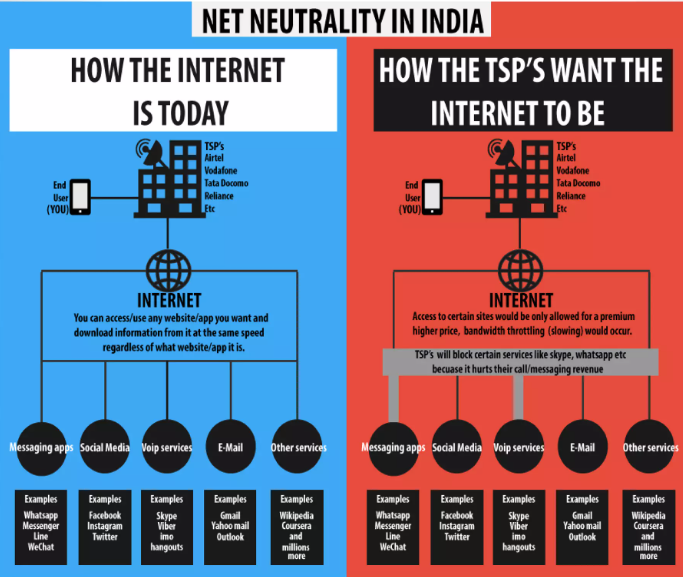21 Mar Net Neutrality
Net Neutrality
This article covers “Daily current events “and the topic is about ‘Net neutrality’ which is in the news, it covers “Government Policies and Interventions” In GS-2, the following content has relevance for UPSC.
For Prelims: Net neutrality
For Mains: GS-2, Government Policies and Interventions
Why in news: Many stakeholders have been arguing the payment of a fee for network infrastructure produced by cellular operators over the last few months.
About Net Neutrality
- Net neutrality is the concept of an open, equal internet for everyone, regardless of the device, application, or platform used and content consumed.
- The idea’s supporters think that all organizations, including internet service providers (ISPs), should treat internet data and consumers similarly. They shall not limit access, slow down access speeds, or prohibit content to serve the interests of specific users.

Net Neutrality
The current net neutrality debate
Origin of Net neutrality
Columbia University law professor Tim Wu coined the term.
Net neutrality is used as a label widely in Internet regulatory and public policy discussions regarding freedom of expression online, competition for services, innovation, pricing, and traffic management. Internet traffic.
Net neutrality is a contentious concept that has had a rollercoaster-like evolution. The debate centers largely around perceptions of the proper role of government regulation and whether internet access should be legally classified as an opt-in service or a public utility.
Cellular Operators Association of India’s demand
COAI, which represents the three major telecom providers in India, Bharti Airtel, Vodafone Idea, and Reliance Jio, has demanded that platforms such as YouTube and WhatsApp pay a cut of income to cover network costs.
The concept of paying for the usage of infrastructure is an excellent one, in which every entity that uses another company’s infrastructure should pay for it.
Yet, the income earned by the infrastructure provider [telecom operators] should be shared in the same proportion with the organization that uses it.
The telecom operators’ apparent allegation is that content providers do not create any of this infrastructure on their own.
Data centers, submarine cables, content hosting centers, content delivery networks (CDNs), and other infrastructure for communication networks are all constructed by OTT platforms.
Arguments against the COAI’s demand
According to critics, collecting a network fee violates the fundamental principles of an open Internet.
Net neutrality activists (as well as content providers) have argued that imposing such a fee, even on a small number of large players, is a distortion of the Internet’s architecture, in which content providers and telecom operators coexist without charging each other, and users pay both, in the form of fees or advertisements, or both.
Telecom providers and platforms help each other flourish, and neither can survive without the other.
Instead of meeting this demand, critics argue that the government should lower spectrum fees and subsidize telecom businesses through the Universal Service Obligation Fund (USOF).
Net neutrality supporters believe that internet access should stay free, open, and non-discriminatory, as this is necessary for a democratic interchange of ideas and knowledge, ethical corporate practices, fair competition, and continued innovation.
Telecom Regulatory Authority of India’s stand
TRAI decided in favor of Net neutrality in 2016, stating that all traffic on an Internet network must be handled similarly.
Even though all Internet access must be priced equally, the telecom regulator decided that programs like Facebook’s Free Basics (now Meta) and telecom operators’ proposals to charge more for data calls using apps like Viber would be unlawful.
In 2018, the Department of Telecommunications incorporated the notion of net neutrality into the Unified Licence, to which all telecom operators and Internet service providers are subject.
Way forward
- Since, the Indian telecom market has considerably outperformed the United States in terms of data utilized per month on mobile Internet connections, owing to a steep drop in rates with the debut of Reliance Jio’s 4G services. Now, Indian telecom operators are imitating the strategy that US carriers adopted aggressively a decade ago.
- A proper mechanism must be put in place to ensure that the exceptions are not used as loopholes by the major internet players.
- The regulator should also implement a mechanism to monitor and enforce net neutrality principles.
Daily Current Affairs for UPSC
Reading daily current affairs is very useful for UPSC aspirants for passing their prelims, mains, and interview examinations. If any UPSC aspirant avoids reading daily current affairs, they can’t able to pass the UPSC examination. The topic discussed above is talking about the details of Net neutrality. So, Every UPSC aspirant should read current affairs daily for increasing their general knowledge. Here, Plutus IAD provides the latest and the best daily current affairs for the UPSC examination. Also, get the weekly and monthly current affairs for the IAS exam preparation.
Download the PDF now:



No Comments